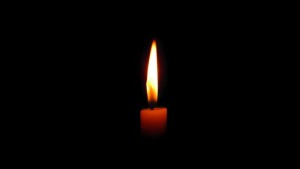As I write this, another mass shooting is underway, this one in southern California. At the same time, I have my Bible open to write a sermon for the second Sunday of Advent, the Sunday on which we light the candle of Peace.
 How does one preach the Prince of Peace when violence surrounds us?
How does one preach the Prince of Peace when violence surrounds us?
We begin with a Gospel of peace that blossomed in defiance of violence.
Jesus was born into a world infected with the darkness of oppression under Herod, Pilate, and Caiaphas, names that struck terror in the hearts of all who lived under their jurisdiction.
We cannot ignore, however, the Christian church’s perpetration of violence in the name of the Prince of Peace. From the crusades to the support of slavery and opposition to civil rights, the Church has shown itself capable of profound faithlessness while only a remnant had the courage to defy the culture of violence.
So, while we speak with one foot on the path of peace, we speak with the other foot in the culture of violence. Though it is in complete opposition to the words of Jesus, the culture’s message is seductive, telling us that the only solution to a bad guy with a gun is a good guy with a gun. And we are the good guys, right?
To quote Jesus, “No one is good but God alone.” (Luke 18:19)
I want to make sense of the violence that surrounds us. What is the motive, or agenda, or diagnosis of a perpetrator? What led him (or them) to pick up a gun and start shooting people? Were the victims chosen, or just random?
But, there is no real sense to be made.
Mass shootings emerge from reactivity, not reason.
When we can make no sense of violence, we can still defy it. We can use all our gifts of love and reason to work to build a more peaceful world to hand off to our children and their children.
In the depths of despair after the death of his wife and the terrible injury of his son in the Civil War, Longfellow wrote these words even as the war continued:
And in despair I bowed my head;
“There is no peace on earth,” I said;
“For hate is strong,
And mocks the song
Of peace on earth, good-will to men!”
Then pealed the bells more loud and deep:
“God is not dead, nor doth He sleep;
The Wrong shall fail,
The Right prevail,
With peace on earth, good-will to men.”
We lift our prayers for the victims of violence. If, however, those prayers absolve us of our responsibility as Christians to be the presence of peace in this world, then we have only half-prayed. The other half of a prayer for peace is to serve the Prince of Peace.
Without faith that the Ground of All Being will ultimately bring peace, defiance looks very much like denial.
Denial ignores evil in the world.
Defiance works against it with the confidence of the children of God.
On our own, our efforts as peacemakers would be futile. With God, all things are possible.
Thanks, Neill. These thoughts helped me solidify how to address the issue of this mass shooting in the midst of our embodying the call to be the ones who “re-fine” the world, starting right here in Lamesa.
I think you have made a good statement, Neil. Unfortunately, you have said nothing about injustice. I’m going to forward your writing to James Noel. I will forward his comment from today to you if I can. Respectfully, Jackie Leonard
Thanks for your comment, Jackie. Injustice is a passing chord, I thought, in the paragraph on the Church’s historical participation in violence. If you would like to expand on that theme, feel free to use this space or post a link here in the comments. Now that I have approved your first comment, the rest should go straight to the blog.